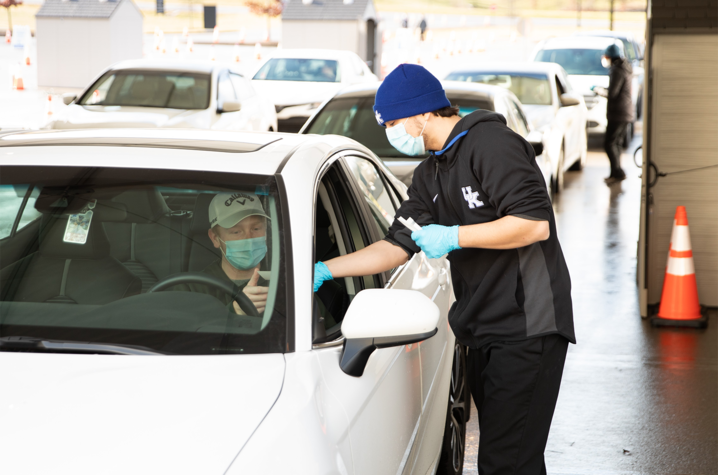Study Finds Americans Value More Options When it Comes to COVID-19 Testing

LEXINGTON, Ky. (Sept. 3, 2021) — COVID-19 diagnostic testing is essential to tracking the virus’ spread and helping individuals, families and communities recover from the pandemic, but people have to be willing to take the test. A University of Kentucky researcher was part of a group that studied which testing features Americans prefer.
Shuoli Zhao, assistant professor in the UK College of Agriculture, Food and Environment, was a part of a national group of researchers studying American’s COVID-19 testing preferences based on method, location and financial incentives. They recently reported their findings in the American Journal of Health Promotion.
“Our study estimates the values of testing features in terms of location and method and explores who values those features,” said Zhao, a faculty member in the UK Department of Agricultural Economics. “We also predict the effectiveness of potential monetary incentives in motivating people who are resistant to test.”
Researchers surveyed more than 1,500 Americans through an online survey in July 2020, when the first wave of COVID-19 started to spread. These individuals were representative of the U.S. population in terms of gender, age, race/ethnicity, education, income and geographic location.
They found most individuals (84%) are willing to take a COVID-19 test. More than half of research participants preferred saliva testing (51.9%) over the nasal test (31.9%). A larger number of respondents preferred home testing (31.7%) compared to a drive-thru testing site (28.9%) or testing in a hospital (23.4%). More than a quarter of survey participants were willing to take a COVID-19 test using a less appealing method or at an inconvenient location if they were financially compensated. However, most individuals who refused a COVID-19 test for reasons other than location and testing method were not persuaded by monetary incentives.
Researchers placed the survey participants into four groups based on their preferences. Participants who preferred comfort were the largest group, followed by those motivated by financial incentives, individuals who prefer convenience and those who avoid testing altogether.
“Our research suggests that we should ensure the testing sites are convenient to the community members and provide flexible testing options that target the right audience,” Zhao said.
Co-authors on the paper include Purdue University’s Bhagyashree Katare and Maria I. Marshall, Joel Cuffey from Auburn University and Corinne Valdivia from the University of Missouri.
The entire article is available online at https://bit.ly/2WNtHM2.
As the state’s flagship, land-grant institution, the University of Kentucky exists to advance the Commonwealth. We do that by preparing the next generation of leaders — placing students at the heart of everything we do — and transforming the lives of Kentuckians through education, research and creative work, service and health care. We pride ourselves on being a catalyst for breakthroughs and a force for healing, a place where ingenuity unfolds. It's all made possible by our people — visionaries, disruptors and pioneers — who make up 200 academic programs, a $476.5 million research and development enterprise and a world-class medical center, all on one campus.




